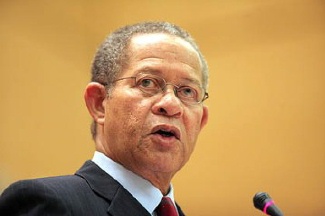Jamaica’s PM Clarifies Position Regarding Jamaica Airline Pilots Association’s (JALPA) Air Jamaica Bid
KINGSTON, Jamaica – In a statement to Parliament on Wednesday February 10th, Prime Minister, Bruce Golding asserted that the competitive tender process that governs the divestment of Air Jamaica, requires the government to pursue diligently and in good faith, the negotiations with Caribbean Airlines which had submitted an offer by the stipulated deadline of June 30, 2009.
This position has been upheld by the Contractor-General in a letter to the lawyers representing Jamaica Airline Pilots Association (JALPA) , according to a statement issued by the OCG on Tuesday.
The Prime Minister has further clarified the Government’s position regarding the proposal from the Jamaica Airline Pilots Association (JALPA) to acquire Air Jamaica:

PM Hon.Bruce Golding
The intense campaign being waged by JALPA to take over Air Jamaica has aroused much emotion but has obscured any rigorous analysis of the proposal it has submitted and its ability to not only execute such a takeover but also to sustain the operation of the air services currently provided by Air Jamaica. The most recent proposal submitted by JALPA provides little evidence that it is or will be able to do so. Further, it is based on key assumptions that are factually incorrect.
JALPA has not up to now presented any credible evidence of its ability to secure the financing required to operate the airline which it estimates to be US$100 million. US$40 million of that amount is to come from redundancy payments to which the workers will be entitled. It has submitted the names of two overseas private equity firms that it claims have offered to source the remaining US$60 million.
In its letter to the Prime Minister dated January 26th, JALPA admits that these private equity firms have not yet reviewed its Business Plan. It is therefore a gross exaggeration to suggest that it has identified sources of financing if this is to mean anything more than identifying sources that it hopes will seek to indentify sources of financing. All of this is subject to a review of its Business Plan and the necessary due diligence, neither of which has yet been done.
In the same letter of January 26th, JALPA also stated that it has identified “another investor who has indicated a keen interest in joint venturing with us” and that this investor “would submit a letter of expression of interest directly to you”. The name of that “investor” has not been disclosed and no such letter has yet been received.
The JALPA Business Plan assumes that total redundancy payments will amount to US$47 million and that US$40 million or 85% of that amount will be converted to equity. Indeed, its letter states that “in excess of 80% of the employees have signed on indicating their interest in participating”.
This assumption is incorrect. The estimated cost of redundancy payments is US$27 million, not US$47 million. Even with an 85% participation rate, there would be a cash shortfall of US$17 million which would severely undermine the viability of its operational plan.
The JALPA Business Plan states that it will have a “lean but focused workforce”. This runs counter to the implied intention to retain 85% of the current workforce of 1,607 to operate a fleet of 7 aircraft. This would result in an employee/aircraft ratio of 195, an uneconomic ratio when compared to American Airlines (113), United Airlines (126), Delta Airlines (109), Continental Airlines (116), Southwest Airlines (65), Northwest Airlines (91), US Airways (92), Air Trans (61) and Jet Blue (72). Caribbean Airlines operates with a ratio of 96 which is diluted even further if its 5 Dash 8-300 inter-island planes are included in the calculation.
There are other operating forecasts in JALPA’s Business Plan including passenger loads, unit costs and revenues that are overly optimistic, given the current realities of the airline industry and the intensity of competition from low-cost carriers operating under the Open Skies Agreement. These forecasts would most certainly be revised once the lender or investor conducts the required due diligence and this will impact significantly and negatively on the viability and sustainability of its proposal.
JALPA has accepted that there would be no recourse to government financing. The risks to be borne, therefore, would be theirs and any investors, including participating staff, or lenders they are able to secure. However, the government’s efforts to divest Air Jamaica are driven by two important considerations:
The necessity to relieve the public purse of the burdensome losses being sustained;
The need to ensure continued operation of the routes that are of strategic value to the economy.
The insistence in retaining the airline in Jamaican ownership, desirable and patriotic though that might be, does not take precedence over these two fundamental considerations and cannot be pursued at any cost or regardless of the risk to the Jamaican economy.



